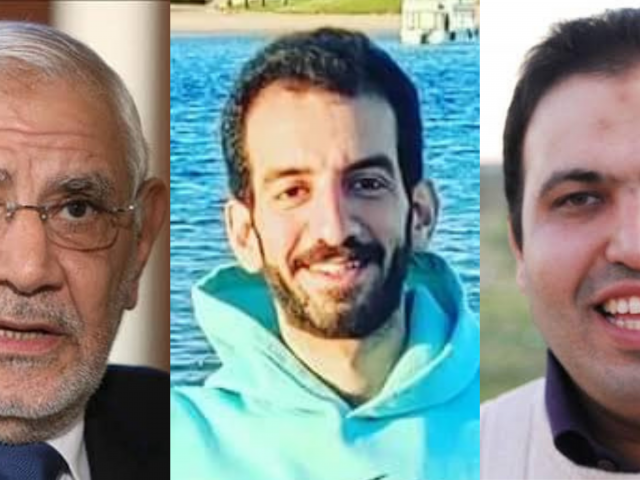
EIPR calls for the abolition of the emergency court ruling against Moaz Al-Sharqawi, Abu Al-Fotouh and Al-Qassas
Press Release
The Egyptian Initiative for Personal Rights (EIPR) condemned the verdict issued today by the Emergency State Security Criminal Court in the Fifth Settlement, convicting all defendants in emergency state security 5th settlement felonies Case No. 1059 of 2021. The court sentenced the second defendant, Mahmoud Ezzat, and the third, Abdel Moneim Aboul Fotouh, to 15 years, on charges of assuming leadership in a terrorist group for the purpose of overthrowing the state, and committing a crime of financing terrorism. The court also sentenced the thirteenth defendant, Muhammad al-Qassas, and the fifteenth defendant, Moaz al-Sharqawi, on charges of joining the same terrorist group, to 10 years in prison, while the rest of the defendants were punished with sentences ranging from life to 15 years in prison and five years of police supervision for all defendants.
EIPR denounces the ruling issued today, as it is not subject to appeal, as well as considering it an extension of the effects of the state of emergency beyond its end. This case was referred suddenly before the announcement of the non-renewal of the state of emergency, despite the release of all the defendants imprisoned in its custody, which indicates that there is no evidence that they committed the charges against them. These rulings confirm the state’s will to prosecute them under the emergency law, to deprive them of their right to appeal the rulings issued against them, and to link their fate to the will of the one who has the authority to ratify the sentences. The Emergency Court ignored the argument presented by the defendants that it did not have jurisdiction to hear the case after the end of the state of emergency, as they were not brought to trial until after its end. The court ignored all their formal and objective defense arguments, so that they had no choice but to wait for the ratification of the judgment in light of the inability to appeal in a court of cassation according to the emergency law.
The events of the case involving 25 defendants began four years ago, after Aboul Fotouh appeared on Al-Jazeera and the BBC, criticizing the political regime's handling of candidates rival to President Sisi. Then, on February 13, 2018, the National Security officer, who conducted the nonserious investigation, obtained a warrant to arrest 16 people. Thus, Abdel Moneim Aboul Fotouh was arrested from his home on February 15, 2018, following the arrest of Muhammad al-Qassas on February 8, 2018 in connection with another case bearing No. 977 of 2017, the case known in the media as “Mekamelin 2”, while Mahmoud Ezzat, the second defendant in the case, was already in remand detention pending other cases. Subsequently, new defendants were added, who were not mentioned in the first investigation report. It should be noted that all defendants were released pending case 440 of 2018, while Abul-Fotouh, Al-Qassas and Mahmoud Ezzat remained in pretrial detention pending other cases.
In March 2018, EIPR’s client, Moaz Al-Sharqawi, former vice president of the Tanta Student Union and member of the Egyptian Students’ Union, found his name published in the Official Gazette among those listed as terrorists, on the basis of his accusation in Case 440 of 2018 of joining an armed organization planning to carry out terrorist acts inside the university in Tanta upon communication and assignment by Dr. Abdel Moneim Aboul Fotouh, head of the Strong Egypt Party. The accusation came after he had won the seat of Vice President of the Student Union at the university in 2015. Al-Sharqawi appealed to the Court of Cassation against the decision to enlist him.
On September 19, 2018, Al-Sharqawi was stopped at a checkpoint and transferred to the State Security headquarters in Tanta, where he remained for 24 days, during which he was tortured.
He was then presented to the Public Prosecution Office on October 13, 2018, after forging the seizure report, which stated that Moaz Al-Sharqawi was arrested from his home in the village of Mit Hobeish in Tanta. After nearly a year and a half of remand detention, the counseling room of the criminal court decided to release him with precautionary measures, and then a month later the measures were canceled.
Although the President of the Republic announced his abstention from renewing the state of emergency and canceling it in October 2021, Moaz Al-Sharqawi was referred to the Emergency State Security Criminal Court in November 2021. Moaz complied to the trial through his lawyer so as not to miss the opportunity to present his defense in order to acquit himself, while insisting on suspending the case pending a decision on the constitutionality of the emergency state security courts’ jurisdiction to hear cases after the end of the state of emergency in accordance with Article 19 of the Emergency Law, as a precautionary request.
During the trial on February 26, 2022, the Court of Cassation upheld the decision of the Criminal Court issued on January 13, 2021 to include the names of the defendants in this case, including Moaz, on the list of terrorists for a period of 5 years, starting from the date of the decision issued by the Criminal Court, with the legal consequences thereof. This was an indication that the court would issue a decision of conviction.
Accordingly, EIPR calls on the President of the Republic to use his powers stipulated in Article 14 of the Emergency Law, which gives him the right to annul the ruling issued today, and to close the case, especially after the defendants were brought to trial after the end of the state of emergency.



